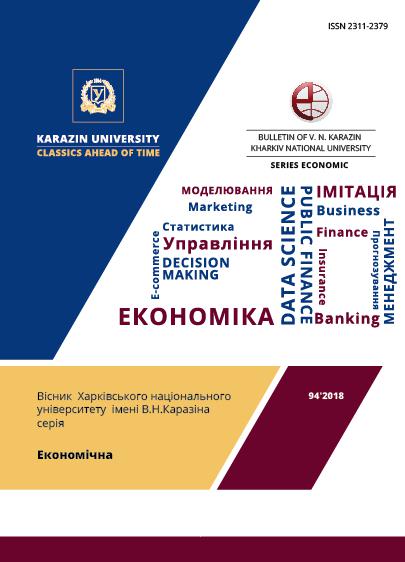Використання дощової води на урбанізованих територіях та управління якістю зливових стоків: еколого-економічні аспекти
Анотація
У роботі розглянуто причини поглиблення сучасних проблем поводження зі стічними водами атмосферного походження та управління якістю поверхневих стоків у містах Європи та світу, проведено аналіз кліматичних та інших природних чинників, що впливають на оцінку перспектив впровадження проектів господарчого використання дощової води у конкретному місті (на прикладі Харкова), наведено результати дослідження навантаження на водні об’єкти, яке спричиняють стічні води атмосферного походження в межах урболандшафтної геосистеми, надана екологічна оцінка стану водного об’єкту.
Аналіз багаторічних статистичних даних та сучасної тематичної літератури свідчить про тенденцію до збільшення кількості опадів у європейських містах помірного та окремих містах тропічного клімату.
Для Харкова в останні 10 років характерна гранична нерівномірність опадів, як з точки зору помісячного об’єму опадів у теплому півріччі (травень-жовтень), так і щодо сумарної кількості дощових днів щомісяця і щосезону. Крім того, спостерігається зміна режиму опадів – зниження кількості дощів помірної інтенсивності і збільшення гроз, зливів, градів.
За сучасними методиками оцінено (з врахуванням проценту території міста зі щільним покриттям) об’єми поверхневого стоку у місті. За допомогою хімічного аналізу встановлено рівень якості поверхневих вод; визначено та надано оцінку навантаженню на водні об’єкти в результаті неорганізованого поверхневого стоку з урбанізованої території.
У роботі представлено огляд успішних міських проектів збирання, ретенції та використання дощової води з врахуванням джерел фінансування та обґрунтовано заходи та рекомендації щодо впровадження проектів блакитної економіки в умовах конкретного міста.
Завантаження
Посилання
Національна доповідь про стан навколишнього середовища в Харківській області у 2015 р. [Електронний ресурс]. – Режим доступу: http://www.menr.gov.ua/docs/activity-dopovidi/regionalni/rehionalni-opovidi-u-2015-rotsi/harkiv_2015.pdf
Rosek Ksz. Wody opadowe jako przedmiot gospodarowania. 2017. [Electronic resource]. – Access mode: http://repozytorium.uni.lodz.pl:8080/xmlui/handle/11089/21639
Wojciechowska E. i in. Wybrane aspekty zrównoważonego gospodarowania wodami odadowymi na terenie zyrbonizowanym. Politechnika Gdańska, 2016. – 78 s. [Electronic resource]. – Access mode: www.GEOMATYKA.eu
Królikowska, A. Królikowski E., 2012. Wody opadowe: odprowadzanie, zagospodarowanie podczyszczanie i wykorzystywanie. – Józefosław: Seidel-Przywecki Sp.zo.o, 2012. – 352 s.
Burszta-Adamiak E. Mechanizmy finansowe gosodarowania wodami opadowymi w miastach. // Zrównoważony Rozwój – Zastosowania. – 2014. – nr. 5. – s. 59-63.
Самойленко В.М. Моделювання урболандшафтних басейнових геосистем / В.М. Самойленко, К.О. Верес. – К.: Ніка-Центр, 2007. – 296 с.
Pinzón T.M. Modelling and sustainable rainwater harvesting in urban systems. – Thesis for Ph.D. degree in Environmental sciences and technology. – Univetsytat Autonóma de Barselona, 2012. [Electronic resource]. – Access mode: tmp1de1
Guerreiro S.B., Glenis V., Dawson R.J., Kilsby C. Pluvial flooding in European cities – A continental approach to urban flood modelling. // Newcastle university ePrints, 2017, 9(4), 296. – 18 p.
Мостепан О.В. Дослідження впливу зливових вод з автомобільних доріг у забруднення водних об’єктів (на прикладі м. Харкова) / О.В. Мостепан // Вісник Харківського національного автомобільного дорожнього університету: сб. наук. трудів. – Х., 2010. – Випуск 48. – С. 37-41.
Юрченко В.О. Дослідження технологічних характеристик поверхневого стоку з автомобільних доріг / В.О. Юрченко, М.В. Коротченко, О.В. Бригада, Л.С. Михайлов // Автошляховик України: наук.-виробн. журн. – К.: Державтотранс НДіпроект, 2012. – Вип. 4 (228). – С. 44-47
Ричак Н.Л. Розрахунок економічного збитку від поверхневих вод атмосферного походження (на прикладі житлової підсистеми) / Н.Л. Ричак, В.М. Московкін, В.В. Кузнєцова // Вісник Харківського університету імені В.Н. Каразіна. – Серія «Геологія – Географія – Екологія». Збірник наукових праць. – Х.: ХНУ ім. В. Н. Каразіна, 2016. – Вип. № 1147. – С. 239-248.
Moskovkin V. M. Bibliometric Analysis of Urban Runoff Study with help of Google Scholar / V. M. Moskovkin, A.V. Prizhihalinskiy, N. L. Rychak , R.V. Lesovik // International Journal of Applied Engineering Research, 2015, vol.10, nr. 24. – P. 45675-45681.
Серикова Е.Н., Стрельникова Е.А. Изменение уровня грунтовых вод в городской экосистеме г. Харькова. // Вісник НТУ “ХПІ». 2016. №4 (1176), C. 132-137.
Сенге П. Пятая дисциплина. Искусство и практика обучающейся организации. – OZON.ru, 2003. – 408 с.
Communication form the Commission to the European Parliament, the Council, the European Economic and Social Committee and the Committee of the Regions Green Infrastructure (GI) – Enhancing Europe’s Natural Capital /* COM/2013/0249 final*/ [Electronic resource]. – Access mode: https://eur-lex.europa.eu/legal-content/EN/TXT/?uri=CELEX%3A52013DC0249.
Монітор погоди у Харкові. [Электронный ресурс]. – Режим доступу: http://www.pogodaiklimat.ru/monitor.php?id=34300.
Dobre praktyki zarządzania wodą deszczową w miastach. // Zrównoważony Rozwój – Zastosowania. – 2014. – nr. 5. – S. 115-127.

